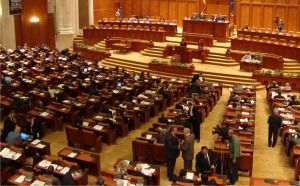• Trichet: "The crisis is systemic"
• Trichet: "Urgent recapitalization of banks!"
European commercial banks no longer trust each other, and suspicion of collapses is rampant (just like the enormous French-Belgian bank Dexia already did, dealing a blow to two countries), concern which prevents them from lending money to each other, freezing the European interbank market.
On Tuesday, "over-night" deposits of commercial banks in the 17 countries of the Eurozone deposited with the European Central Bank, (ECB), rose to 269 billion Euros, the highest since June 2010, indicating how much the confidence in the solvency of the Eurozone banking system has eroded.
Also yesterday, on a note of panic, Jean-Claude Trichet (who is currently in the transition period before handing over the reins of the ECB to Italian Mario Draghi), made the following statement before the Economic and Monetary Affairs Commission of the European Parliament (to which it had already submitted the Operational Report, ever since October 4th):
"The crisis is systemic and needs to be attacked decisively. The high degree of interconnection of the EU financial system has led to the rapid increase of the risk of significant contagion. This threatens the financial stability of the EU as a whole and affects the real economy in Europe and beyond its borders".
Trichet continued on the same note:
"The European banking sector needs recapitalization, this is part of our message. Decisions must be made, very urgently. I expect this decision to be made as soon as possible".
Trichet said: "There is a need for transparency and for a consistent evaluation of the exposure of banks to sovereign debt", thus suggesting that the danger of some of the countries in the Eurozone going into default has reached "the moment of truth".
Trichet recommended:
"The possibility of having the European Financial Stability Fund (EFSF) lend money to countries for the recapitalization of banks would be beneficial", distracting attention from the purpose for which the EFSF was created.
Created through the decision of the Ecofin Council of May 9th, 2010, the EFSF is guaranteed by the EAMS (the Eurozone Member States) to issue bonds of up to 440 billion Euros, to help countries in the area, when in trouble (like it happened with Greece, Portugal & Ireland, when they found themselves unable to repay the loans they had borrowed by issuing government bonds).
The recommendation of Jean-Claude Trichet changes the intended purpose of the EFSF funds from rescuing states to rescuing banks.
The worry demonstrated by the speech of Trichet on the urgency of the measures (in the last days of his eight year tenure at the helm of the ECB) doesn"t seem to jibe with the way too distant deadline (November 3rd-November 4th), set by German chancellor Angela Merkel and French president Nicolas Sarkozy, who, at the end of last week, promised that a plan for recapitalizing European banks and solving the crisis would be discussed at the G20 summit of Cannes.
Because the expression used by Trichet ("Decisions must be made very urgently"), doesn"t sound like he meant 23 days from now.
It sounds more like "Now".
It needs to be said that in the Romanian banking system, "The market share of lenders with foreign majority shareholders is 85.1%", to quote verbatim the website of the Romanian Banking Association, an institution which has just celebrated 20 years and to which we once again wish "Happy Birthday!"
Trichet yesterday said that the EFSF should apply to countries that aren"t part of the Eurozone as well.




























































